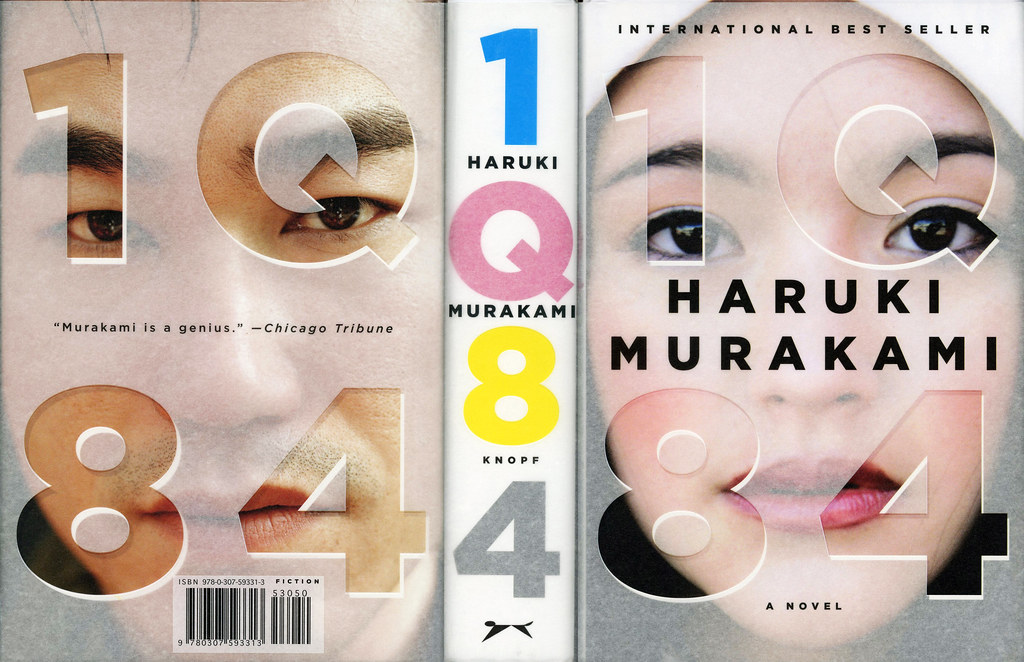Book Review: 1Q84 by Haruki Murakami (2011)

I am also a chronic abandoner of books in midstream. I have no patience for books -- specifically novels -- that don't keep my attention. Less than no patience. I in fact look for reasons to abandon a book that's anything less than compelling. Anything less than that feeling of "damn, I can't wait to read more of that book" and I need to move on. Life's too short. Do you watch TV shows that bore you? No. You change the channel (or pick a new one, whatever) and find something that does. Sure, reading Crime and Punishment or Moby Dick might make you a better person. If you've got the time for that, fine. But I think what makes me a better person is being inspired and absorbed by what I'm reading or watching, not forcing my way through it.
How exactly Haruki Murakami was able to do that in 1Q84, I am not full certain. It is a feat of magic in and of itself. There's just something about the way the book is paced. Something about the simple, stripped-down prose and the simple, elegant depth of the characters. That's to say nothing of the bizarre yet completely familiar world which Murakami creates in this novel -- and all of his fiction that I've read. Murakami has a way of playing your expectations like that, showing you a world that is in many ways like yours, but is also dark and mysterious -- magical -- in a way that pulls you irresistibly forward.
Set in Tokyo in 1984, 1Q84 is part fantasy, part noir, part mystery, part love-story. It follows the gradually intersecting lives of a female assassin, a math teacher, a young aspiring novelist, and a host of other supporting characters who find themselves enmeshed in an alternate reality. That's about all I'll say about the plot, because it's intricate as hell and I hate plot synopses.
Murakami is a consummate artist. One of the greatest writers that has ever lived at any time, in any language, in any country. And his material is memory, nostalgia, longing, and how these interact inside the depthless reaches of the human mind over time -- sometimes decades or a lifetime. There is no one better at exploring those depthless reaches and creating outside worlds to match those inner ones, than Murakami. Personally, it took me a while to get into his writing. It took attempting (and abandoning) two of his novels 10 years ago, and then reading a half dozen or so of his short stories in The New Yorker before I finally decided to give one of his novels a try. I went in for a big bite, knowing I would either hate it and never give another Murakami novel another try as long as I lived, or love it and emerge on the other end completely obsessed with his writing. As you can probably guess, the latter happened.
That said, I would have liked to learn a little more about the more "mystical" elements of this story. In that regard, Murakami really leaves the reader hanging, guessing, and not completely understanding anything about the fantasy-level of the plot. But the characters don't really understand it either. And perhaps there is nothing to understand. One thing you have to accept if you are going to read Murakami is that you have to appreciate the journey. With a lot of magical realism, the end does not justify the time you put into the story. This is not Flannery O'Connor. No one gets gored by a bull on the last sentence of the story. There is no final showdown. You have to enjoy the whole process, enjoy just being immersed in the world Murakami creates. Because the plot moves so slowly and methodically, and ultimately does not deliver in the "conventional" sense. If you're looking for a thriller, in that sense, do not touch this book.
As a writer, the best I look for in a book is that it somehow changes or re-casts the way I look at my own writing, or even what's possible in novel writing, in general. I don't know if my next book will be a 1157 page magical realism novel set in Japan, but there is much to be learned and taken away from Murakami's masterpiece 1Q84 as a writer, if not simply as a reader. It's the way that, for most of the book, the prose manages to be so smooth that it actually recedes and lets the story take over. Naturally, it isn't always like that, and there are some moments or turns of phrase I could have done without. But the damn book is nearly 1200 pages long.
I can't in good conscience say "Go out and buy 1Q84." What I can say is, at least attempt to read a few Haruki Murakami short stories. If you're at all intrigued by what you read, maybe you're ready for 1Q84. We are still in quarantine, after all. I can promise you that although the book feels as heavy as a brick it reads more like a graphic novel and -- if you're into it or into Murakami -- it'll be well worth your time.

Comments